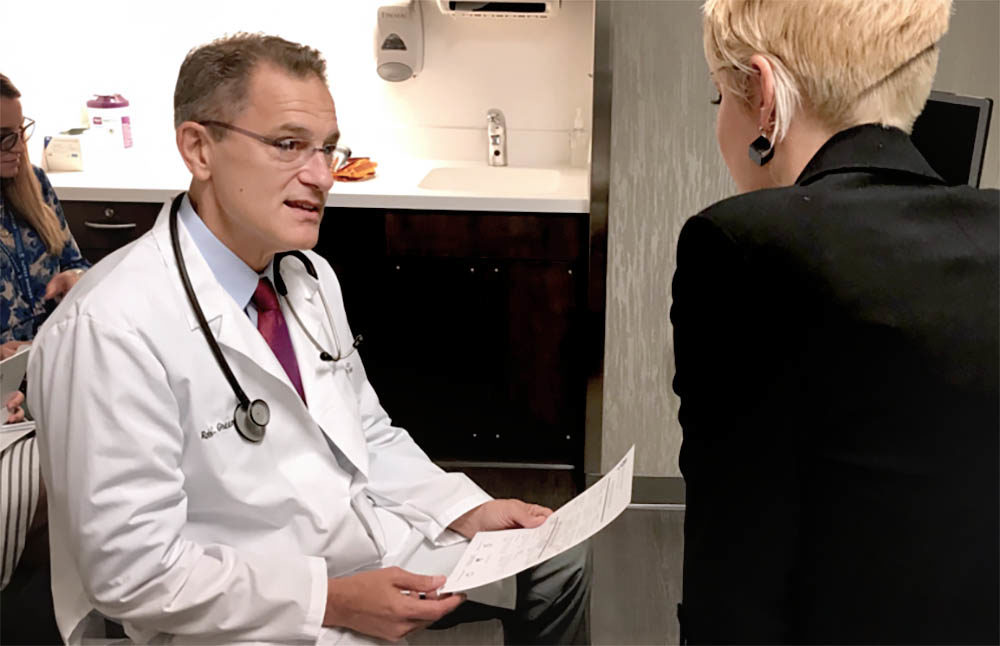Advertisement
Concierge DNA Testing: Boston Doctors And Genetic Counselors Consult, But It Will Cost You
Resume
In a medical exam room at Boston's Brigham and Women's Hospital, Dr. Robert C. Green goes over a menu of DNA tests with a new patient.
"So based on your physical examination, your medical history and your family history, you don't really need genetic testing," he advises her. "But if you want to look at some of the options for predictive genetic testing and possible preventive care, we've got a couple of options for you."
There are the big-ticket "whole-genome" tests that look at more than 3,000 genes and can cost nearly $3,000 for a full interpretation. "And we've got some more limited and less expensive panel options," Green offers. "For example, if you were really concerned about cancer, there's a $250, 61-gene cancer panel which is very specific for cancer."
The patient asks for "the most comprehensive medical one." Nicole — who asked to be identified only by her first name out of privacy concerns — is a 40-year-old Boston entrepreneur and a genomics enthusiast eager to further the field. So eager that Green reins her in a bit as they go through the menu, and she eyes the option that tests the most genes.
"Yes, they actually do more genes," he says, "but they include a lot of genes that have not actually had strong evidence of association with disease."
This is the sort of expertise offered at the new Preventive Genomics Clinic at Brigham and Women's, which officially launches Friday.
From 23andMe to Ancestry, home DNA testing has become so popular that a recent survey found that one in seven American adults has tried it.
Now, the new clinic is offering what's arguably the opposite of modestly priced, do-it-yourself tests: It's a full-service genomics clinic for patients who want the elite care of an academic medical center and will pay for it out of pocket.
It's among the first such clinics in the country, Green says, and an idea whose time has come.
"This is not standard of care, and most people including me would agree it's not ready to be standard of care," he says. "But I've become convinced, on the basis of truly 15 years of immersion and data collection in this area, that this is more than ready to be available to people who want to use it in their health care."
Now, he needs to convince insurers. There's a "Catch 22" here, Green says: Insurance companies want to see clear medical benefits before they'll cover something, but how do you get enough patients to prove the benefits if it's not covered? For now, by having patients enthusiastic and well-heeled enough to pay.
Prenatal DNA tests began this way too, says Dr. Tony Gregg, president of the American College of Medical Genetics and Genomics. At first, only pregnant women who could pay for them got them.
"Now, increasingly, Medicaid programs and insurance companies are paying for these new technologies very routinely," he says. "And this is going to go through that kind of a paradigm."
What's The Value?
Research by Green and others suggests that testing healthy people can be worthwhile, because roughly one in 10 carry genes that put them at high enough risk for cancer or other conditions to be worth knowing about.
But it remains to be seen how the testing plays out: Will it actually improve people's health care? And at what cost?
Gregg says several programs like the new clinic at the Brigham are expected to crop up around the country in the coming months, and the Geisinger Health System in Pennsylvania has been a pioneer.
"We'll all learn more as these programs move forward," he says. "We don't know what the value is of population-based genetic testing. So these programs allow us to get a glimpse of what that value could be."
For example, if many more people find out they have genes linked to cancer, how that affects their treatment, and their lifespan. And which other genetic variants are important enough to test for routinely.
Until now, people who order popular DNA tests like 23andMe have mainly been checking the results on their own.
"The concern about direct-to-consumer testing is that patients don't necessarily, before testing or once their results are returned, understand what that test is saying, and what its limitations are," Gregg says.
Customers who get worrisome news often then consult with their doctors, usually a primary care provider who "may or may not be knowledgable enough to use the information and speak to the patient on their specific circumstance," he says.
The Preventive Genomics Clinic at the Brigham offers extensive interpretation, including from genetic counselors like Carrie Blout. "No one test is perfect," she says. "And that is the benefit of having someone talk through your options, your goals, your history to try to inform what might be the best test for you."
In the exam room, the patient Nicole swabs the insides of her cheeks to gather cells for DNA testing. Ten times on each side, and then the swab is packaged in a vial of fluid to be sent off, lightly pinked with lipstick.
She'll get her results back in a few weeks, along with counseling on what they do and don't mean. And the clinic will follow her for research on how that knowledge affects her health care.
This segment aired on August 16, 2019.
